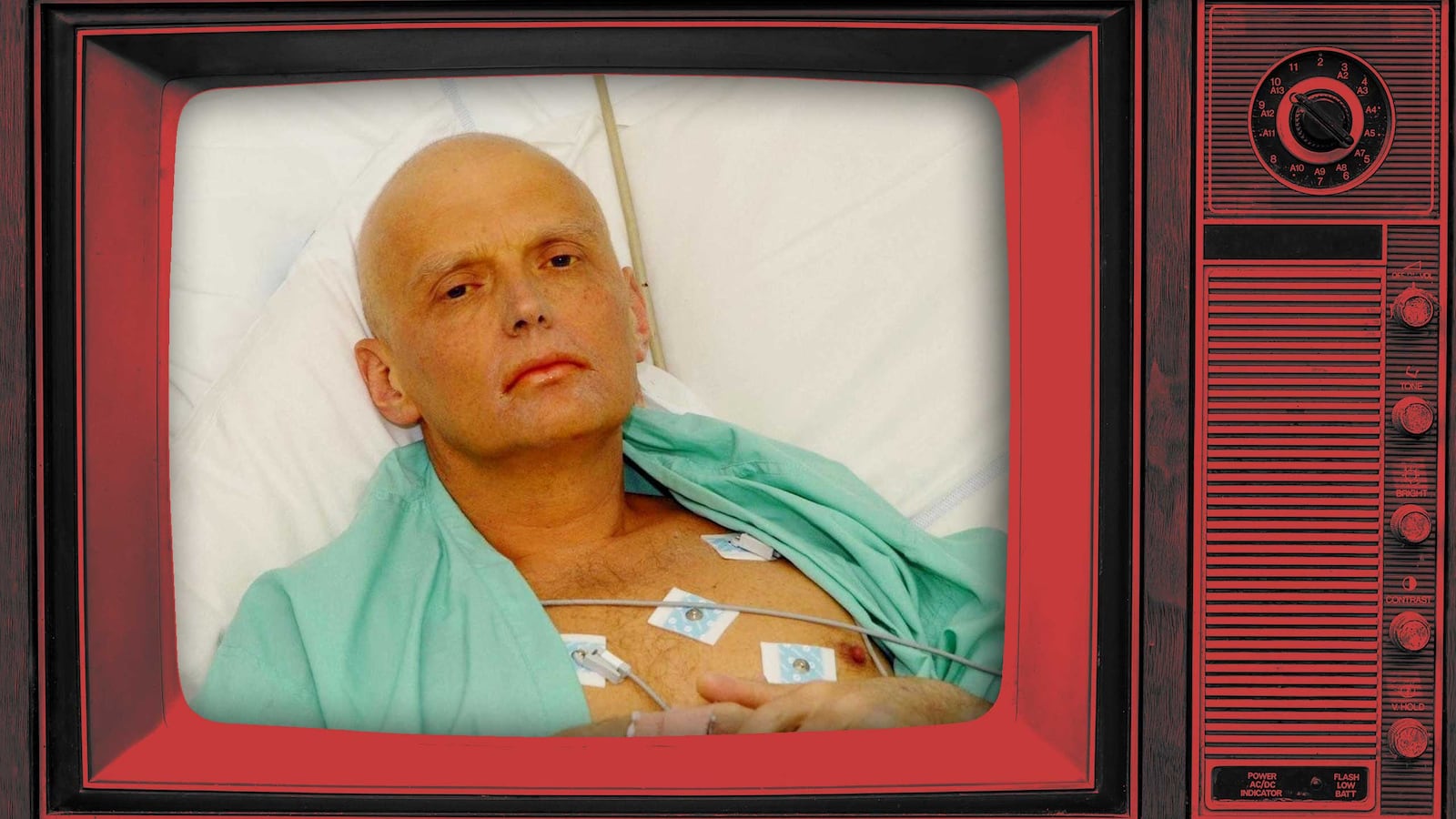Libel suits by wealthy Russians with Kremlin connections have been frequent features on the western judicial landscape for many years. Now it's Russia's turn be a defendant. Today Alex Goldfarb, a naturalized American citizen and microbiologist who emigrated here from Russia in 1975, has filed a complaint for malicious defamation with the U.S. District Court in New York's Southern District against two Russian state-sponsored television stations: Russia Today (RT) America and Channel One.
The complaint stems from the 2006 London poisoning by polonium-210 of Alexander Litvinenko, a former officer with the FSB (Russia’s Federal Security Service) and a close friend of Goldfarb, who helped Litvinenko gain asylum in the U.K. in 2000.
In 2016 the British High Court of Justice found, after an extensive public inquiry, that the murder was carried out by two Russians, Andrei Lugovoy and Dmitry Kovtun, who were hired by the FSB and were "probably" acting on Putin's orders.
Litvinenko's father, Walter, who had been at his son's death bed, along with Goldfarb and Litvinenko's wife Marina and others, initially condemned Putin publicly for the murder. But in early 2012, after being cut off from financial support by Litvinenko's mentor in London, exiled oligarch Boris Berezovsky, Walter changed his story. He went on Russian state television to beg forgiveness from Putin, saying that he discovered Alexander had worked for Britain's MI6 and thus was a traitor: "He might as well have been killed by Russian secret services. They had a right to do it because traitors are to be killed."
But the Kremlin was insisting that it did not orchestrate the murder, so a few months later Walter, ensconced in a new government-provided Moscow apartment, changed his narrative to claim that Goldfarb and Berezovsky were his son's killers.
Goldfarb charitably forgave Walter Litvinenko for his statements, testifying at the British Inquiry: "He [Walter] is an old man. He had a tremendous loss… His second wife died and he was devastated."
But shortly after the March 2018 poisoning of Sergei Skripal and his daughter Yulia in the U.K., Russia's Channel One trotted out Walter to sit amicably next to his son's killer Lugovoy and embellish his false version of the Litvinenko case before a large live audience.
Walter, highly agitated, claimed that his son was poisoned again in the hospital, and added that, just after Alexander died, Goldfarb's wife, crying, told him in English: "Walter, Walter, Alex [Goldfarb] killed Alexander." Walter said Goldfarb’s wife was a young woman, 28 years old, and died within a month, implying that she was murdered. (In fact, Goldfarb's wife, Svetlana, was 51 at the time and died of breast cancer in 2010. She would have spoken to Walter in her native Russian.)
What especially aroused the indignation of the Russian audience was Walter's assertion that Goldfarb was working for the CIA, Russia's bogeyman and go-to fall-guy for everything that goes wrong at home and abroad.
Walter repeated his accusations against Goldfarb 10 days later on a Channel One program called "Man and Law," where he again appeared with Lugovoy. Lugovoy claimed falsely that Goldfarb "was professionally involved with nuclear physics." Thus, he went on, "the polonium-210 could have been his [Goldfarb's] idea and probably his practical doing." Two subsequent programs featured Walter with his son's other killer, Dmitry Kovtun, who discussed Goldfarb's seemingly inappropriate influence on Marina Litvinenko, and Lugovoy again to provide more sinister explanations for Goldfarb's alleged motives in killing Litvinenko.
Meanwhile, on April 1, Walter made an appearance on RT for a one-on-one interview with Russian anchor Oksana Boyko. Goldfarb, he explained, killed Litvinenko because Litvinenko wanted to return to Russia and murdered his wife "because she knew too much and spoke too much."
As for Putin’s possible role in the case: "The president is on top of everything. And I see he is a decent person. He does not do such nasty things." To make his point, Walter insisted that his son was not a traitor and that he had been on friendly terms with the Russian president. Marina Litvinenko, by contrast, is supposedly controlled by western intelligence services.
As Goldfarb observed about this slander campaign against him, "It is not just [about] spinning a particular murder case, but part of a larger effort to clear the Russian state of the horrific crimes [it] has committed. And this includes not only Litvinenko's murder but of course the downing of the Malaysian airliner and the poisoning of the Skripals."
But for Goldfarb—and for Marina Litvinenko, who is supporting his complaint—the Russian campaign is also taking a personal toll: "It is not pleasant when 60 million people around the world hear that you are a murderer, not only of someone in London, but of your own wife. And then all the friends start calling and telling you 'We don’t believe a word of what we just heard about you on TV.' It is kind of a creepy feeling."
What is also very scary about the campaign against Goldfarb choreographed by the Kremlin is how the tactics resemble those of the Stalin era, where witnesses in the notorious show trials were paraded out to utter absurd lies before kangaroo courts.
As then, many Russians today believe the lies, or say they do. In an opinion survey by the independent Russian Levada Center, conducted in late January 2016, after the British court released its findings on the Litvinenko case, the majority of respondents who were familiar with the allegations said the findings were unfounded.
At the end of March this year, Levada pollsters asked Russians what they thought of British claims that their government was involved in the Skripal poisonings. Only 9 percent of the respondents thought the accusations had any basis.
Stalin also carried out revenge against his enemies abroad, including Leon Trotsky, who was stabbed to death with an ice-axe in 1940 at his home in Mexico.
Is Goldfarb on Putin's hit list? Is the propaganda campaign against him a sign that the Kremlin is laying the groundwork for violence? The FBI was concerned enough to visit Goldfarb at his New Jersey home in May, to inquire whether he had noticed anything suspicious that might cause him to think he was being targeted. Goldfarb said no. His reasoning, as he explained to me, is that he is much safer here in America than in Britain, where numerous Putin critics have been killed: "I think U.S. citizenship still protects. Putin would not do to Trump what he did to Theresa May."
Let's hope that Goldfarb is right. President Donald Trump has stated repeatedly that he doubts Putin is a killer and respects him as a strong leader. In January 2016, responding to a question about the Litvinenko case, then presidential candidate Trump told Fox television: "In all fairness to Putin… He hasn't been convicted of anything…He says he didn't do it. Many people say it wasn't him. So who knows who did it?"
Trump has also made it clear that he opposes U.S. sanctions against Russia, but as shown by new sanctions over the Skripal poisoning imposed on Russia on August 27, Trump's powers to prevent such measures are limited. In fact, Congress recently passed legislation requiring Trump to justify in writing any effort to ease sanctions on Russia, which will be followed by congressional review. But apparently the Kremlin has not grasped this fact, or chooses to ignore it.
While sanctions have clearly had a harmful effect on Russia's economy, they do not seem to have influenced the Kremlin's behavior. Judging from recent commentary by Russia's political and media figures, Russian officials, who strongly support Trump, consider western sanctions to be part of a global conspiracy against their country and have no intention of making concessions in response.
Goldfarb is hoping his litigation against Russian television will have a different impact. In an online appeal for financial support for this effort, Goldfarb and Marina Litvinenko noted: "Much has been said about Russian efforts to subvert Western democracies through propaganda and fake news. Little has been done to stop it. It is about time someone calls into account Kremlin's masters of disinformation who fabricate and spread lies while posing as journalists."
Libel cases against the media are rarely successful in the U.S. because the plaintiff must demonstrate that the defendant knowingly broadcast lies. In this lawsuit, however, Russia's Channel One and RT will be hard put to argue that they were ignorant of the British findings in the Litvinenko murder and of Walter Litvinenko's absurd falsehoods and inconsistencies in his statements about the case.
Still, it is unlikely that the Putin regime will stop doing what it does best—spreading lies and disinformation to exonerate itself of its crimes. Just today, the niece of Sergei Skripal, Viktoria, who lives in Russia and has frequently spoken out to refute British claims of Kremlin involvement in the poisonings of her uncle and cousin, gave an interview with the Russian paper Izvestiia.
Not surprisingly, Viktoria said she doubted that the two Russians named recently by British authorities were culprits in the poisonings: "They [the British] had to say something. And Theresa May had to somehow rehabilitate herself with the parliament. After all it has been six months –September 4 exactly – since the poisonings... You can't believe the photographs [of the suspects]…They might have been photoshopped."






